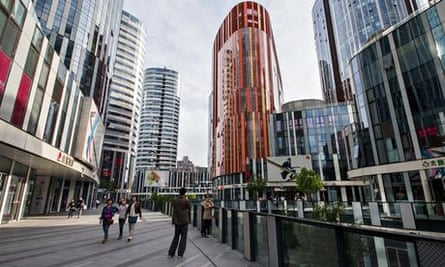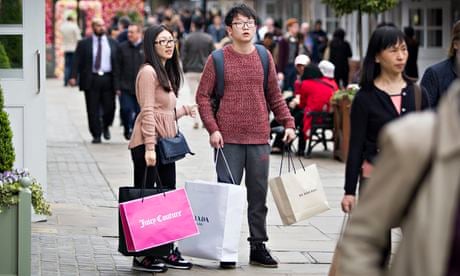China's looming coronation as the world's largest economy, years ahead of schedule, is probably not particularly surprising in one sleepy corner of Oxfordshire. Around half of the international visitors who flock to Bicester retail village are Chinese nationals, making the one-hour train trip from London, or using the fleet of special coaches that head there each day – to stock up on luxury goods.
A World Bank-backed report has declared that the country's national currency, the yuan, will go further than previously thought in the hands of the Chinese consumer and that this supercharged purchasing power will push the world's second-largest economy ahead of the US this year.
This could be the century of the Chinese consumer, now a figure of central importance for luxury goods companies including some of the biggest retail names in Britain.
Gareth Leather, Asia economist at Capital Economics, says the UK stands to be benefit substantially from the spending power of the Chinese. "China is a huge market for luxury goods, and there are high taxes on luxury goods in China, so there is a tendency to travel abroad. The UK has missed out on this to an extent, because visa issues have meant it is as open to Chinese tourists as other countries, but the government is looking to change that."
Last October, George Osborne announced plans to simplify visa applications for Chinese tourists visiting the UK. According to a report by Barclays, the easing of restrictions will encourage shopaholic Chinese tourists to spend £1bn a year in the UK by 2017 – an 84% increase from 2013.
Chinese buyers are brand junkies, and the Bicester outlets of their favourite labels are heaving. A sprawling two-floor Burberry store is packed with Chinese visitors poring over the brand's trademark trench coats and accessories, while the Prada branch nearby is thronged too.And this is not just window shopping. To judge by the masses of shopping bags bearing luxury names such as Ralph Lauren and Gucci, as well as Burberry and Prada, some serious cash is being spent.
The popularity of this outlet village among Chinese visitors has spurred owner Value Retail to open an outlet centre in China itself. Suzhou Village, near Shanghai, is scheduled to open on 15 May, targeting China's swelling middle class. The centre's 100 shops, restaurants and cafes will be within an hour's drive of 40 million people.
And for the long-term health of the Chinese economy – and of the global financial system – it is a necessary development. If western economies such as the UK's are to tilt back towards export-driven growth, China's status as the world's factory floor has to change. The west needs China to open up as a market that consumes goods rather than just making them.
And China itself needs to lessen its dependence on an economic model that fuels manufacturing and infrastructure growth with artificially low interest rates, as this punishes savers and has seen households take on a teetering edifice of debt.
Rob Wood, economist at German bank Berenberg, says: "So far China's growth has been based on strong investment growth, and you would expect that with a developing country. But China has bought a lot of machines now, and it needs domestic demand for the goods it is producing. It is going to be hard because it has relied on investment for so long, but that is the way countries move from being low-income to high- income, and it is potentially important for the UK."
The scale of the challenge is huge but, Wood says, the authorities have demonstrated a determination to change the growth model.
China's growing pains have had unintended consequences for a luxury goods sector that has benefited from the nation's rise so far, but finds itself exposed to the vagaries of the Chinese economy. A crackdown on corruption, announced by President Xi Jinping last year, has been an unexpected blow.
At Diageo, the British drinks group, sales in China of the traditional white spirit baijiu have been hit in the ensuing drive against gift-giving. The backlash has also been painful for Diageo's French rival, Rémy Cointreau, where sales of cognac fell 32% in the final quarter of the year to March, following a 30% drop in the third quarter.
The attempt to unravel a culture of lavish gifts and extravagant spending among officials has also hit the restaurant trade and sales of other luxury goods, such as watches. Growth in China's luxury market slowed to about 2% in 2013 from 7% in 2012, according to consultancy Bain. Sales of watches, which make up more than a fifth of the total domestic luxury goods market in China, fell by 11%.
"The highly visible government campaign encouraging frugality and focusing on corruption had a large impact on gifting, which had been one of the major growth engines of the sector," Bain said.
Brands with outlets at Bicester will be hoping that the corruption clampdown will not dampen Chinese appetites abroad. Bain estimates that around two-thirds of luxury shopping by Chinese consumers is done outside China.
But the ascendancy of the Chinese consumer is predicated on more than just British retail villages and largesse directed at party officials. There is also the impact of people in China who are earning money honestly and want to spend it – and this can be felt 5,000 miles from Bicester.

Beijing's upmarket Sanlitun shopping district consists of two outdoor malls joined by a 500m-long row of seedy bars and restaurants. South Sanlitun Village is stacked with mid-range chains such as Uniqlo, Nike and Starbucks. It is a thoroughfare of fashionable young Chinese and camera-wielding tourists.
But to cross into the North Sanlitun Village is to enter a more rarefied world. Its flashy European boutiques – Balmain, Marni, Givenchy – stand grandiose and empty around a vast paved square. Looking at the window display in Emporio Armani, Shi Wen, a design student at the Beijing Institute of Fashion Technology, says luxury goods in China are caught in a bind. People have more money than ever, but ostentatious displays of wealth are increasingly taboo, considered the province of coal bosses and corrupt officials rather than a tasteful, cosmopolitan class.
"Chinese people only started making money in the 1980s," she says. "They wanted to show it, but didn't have any taste. Now, people will still spend a lot of money on luxury goods, but they want to look subtle and sophisticated." Shi is wearing tight black jeans and a black leather jacket. She says her favourite brand is US leathergoods maker Coach.
In a Sergio Rossi outlet across the square, £400 pairs of shoes sit in untouched rows in an empty, thickly carpeted atrium. "Business is all right," says one saleswoman, who declines to give her name. "I spend most of my time waiting around."
Bill Dodson is a US-born writer of books on Chinese society and economy who lives in Suzhou and works in Shanghai. He says the crackdown appears to be having little impact on normal life: "I don't see any effect on the daily purchasing habits of middle-income and rich Chinese as a direct result of the clampdown on government purchasing excesses. In the downtown Shanghai office in which I work, women coworkers are still turning over their wardrobes with abandon. They seem to have the same level of anxiety about falling behind the fashion times as ever."
He says the reason Chinese nationals prefer to buy luxury goods abroad is because of a lack of trust in branding – and genuine safety issues with domestic products, from foodstuffs to cars, clothing and electrical goods – not because of any clampdown or general economic slowdown.
The conversion of China to a consumption-driven model is taking place against a backdrop of slowing growth. China's economy grew by 7.4% in the first quarter of 2014 compared with the same period a year earlier, following 7.7% growth in the fourth quarter of 2013.
It was the lowest rate of growth in 18 months, but markets nevertheless reacted positively to the data, because it beat expectations of a GDP increase of just 7.2%. The slowdown does, however, raise the prospect of the Chinese government missing its target for 7.5% growth in 2014, unless further stimulus measures are announced.
Economists at Fathom Consulting believe the slowdown has much further to go. "Our benchmark assumption is that China will slow to a rate of just 5% this year. In our worst-case scenario, that figure plunges to 2%."
This has not dampened the attractiveness of Chinese consumers to western investors. The display of Chinese spending power in Bicester is merely an analogue indication of a 1.84 trillion-yuan online shopping market in China, one potential shareholders are keep to tap.
Last week China's biggest online retailer, Alibaba, announced plans for an initial public offering in New York that could value the business at $200bn. Analysts believe this could be the biggest technology stock sale in history, dwarfing even that of Facebook, as investors bet on further stellar growth in what is already an enormous market.
According to Alibaba's filing with US stock market regulator, its three main marketplaces – Taobao, Tmall and Juhuasuan – last year notched up 231 million active buyers and 8 million active sellers, and generated transactions totalling $248bn. It is numbers such as these that lie behind the appeal of the Chinese consumer market to investors.
And there has been one telling bright spark in recent Chinese economic figures. Investment was weak in the first quarter and industrial production disappointing, but retail sales have been better than expected, boosting Beijing's hopes that consumption will continue to hold up. And that is key, not just to Bicester but to Suzhou Village – and the entire global economy.

Comments (…)
Sign in or create your Guardian account to join the discussion